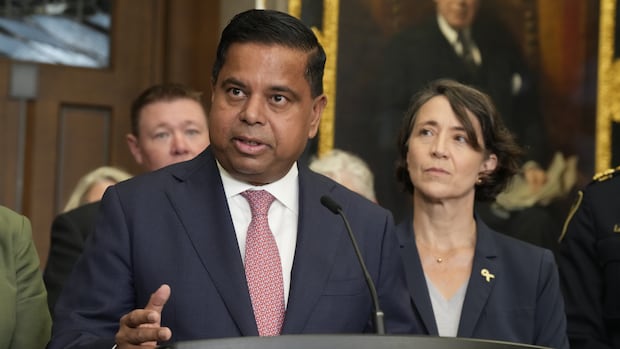Buyback program for banned firearms to begin in Nova Scotia next month

The Liberal government will begin its long-awaited gun buyback program for individuals next month with a pilot project based in Cape Breton, N.S.
Public Safety Minister Gary Anandasangaree announced the pilot program in Ottawa on Tuesday, saying the buyback is voluntary and that "no one is having their weapon confiscated."
"We want to be sure everything is working properly before we open the program nationwide later in the fall," Anandasangaree said.
The minister also announced that the buyback program for businesses, which ran from the fall of 2024 until April 30, will reopen later this fall.
Government officials said Tuesday that the program for businesses has so far collected 12,000 prohibited firearms, doling out $22 million in compensation.
People with a valid gun licence in Cape Breton will be notified by the RCMP that they are eligible to participate.
Government officials said that on Oct. 1 an online portal will allow gun owners to declare their interest in participating in the program.
If accepted they will be given an appointment with the Cape Breton Regional Police Service to arrange collection of the firearms.
The announcement fulfils an election promise made by Prime Minister Mark Carney to reinvigorate the assault-style firearm buyback program that was launched in 2020 — shortly after the mass shooting in Portapique, N.S., which left 22 people dead.
Violating the lawSince 2020, the Liberal government has banned 2,500 "assault-style" types of firearms with the promise to buy them back.
The ban came with a two-year amnesty that allowed owners of guns like the AR-15 to be turned in until April 30, 2022. That amnesty period was extended by a year in 2022 and then by another two years in 2023 to Oct. 30, 2025.
Anandasangaree has previously said that date will need to be pushed back further, but on Tuesday no specific amnesty date was announced.
Guns on the list cannot be bought, sold, lent, imported or used in Canada and they have to be given to police or deactivated using a licensed gunsmith within the amnesty period.
Until banned guns are disposed of or deactivated they have to be securely stored and cannot be transported except when being moved to dispose or deactivate them.

While the minister said no one will have their guns taken from them, government officials said Tuesday in a technical briefing that the only part of the program that is voluntary is having the choice to turn a firearm in or have it deactivated.
Officials explained that those who refuse to deactivate or turn in their banned firearms during the amnesty period will be in violation of the law.
On Monday, an audio recording of Anandasangaree with an unidentified gun owner suggested that they shouldn't worry about being arrested for refusing to turn in a banned firearm because municipal police have few resources to devote to such matters.
"I just don't think municipal police services have the resources to do this," the minister can be heard saying on the recording.
The minister said in a statement on Monday that his recorded comments were "misguided."
Asked about this Tuesday, Anandasangaree insisted that police forces will be able to do their jobs.
"I have every confidence that law-abiding citizens will ensure compliance with the law," Anandasangaree said. "Secondly I also have every confidence that law enforcement will be able to do its job and to ensure the implementation of the Criminal Code."
The minister said that as a rule of law country, it is imperative that all Canadian police are able to enforce the law.
A government statement accompanying the announcement said that "all affected firearm owners or businesses will have to comply with the law by the end of the amnesty period to avoid criminal liability for the illegal possession of a prohibited firearm."
cbc.ca





